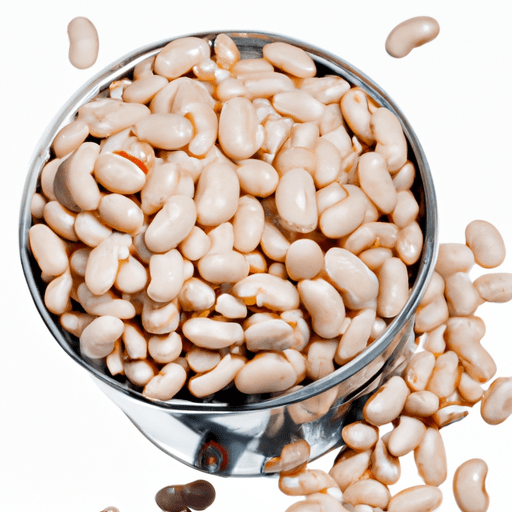Canned White Kidney Beans: A Versatile and Nutritious Pantry Staple
If you’re exploring ways to enhance your culinary skills and bring more versatility to your cooking, look no further than canned white kidney beans. These small, creamy legumes offer a delightful combination of taste, texture, and nutritional benefits that elevate any dish they grace. In this blog post, we will delve into the world of canned white kidney beans, from their distinct taste and common uses in cooking to their nutritional profile and some fascinating facts. Let’s get cooking!
Taste and Texture Worth Savoring
Canned white kidney beans, also known as cannellini beans, showcase a mild and slightly nutty flavor. These beans have a creamy yet tender texture, making them an excellent addition to a wide array of dishes. Their versatility ensures that they can create depth in soups, stews, salads, pasta dishes, and more.
Common Uses in Cooking
Canned white kidney beans are a go-to ingredient for countless delicious recipes. Here are a few popular ways they are frequently used:
1. Soups and Stews
Their velvety texture and ability to absorb flavors make canned white kidney beans a standout choice for hearty soups and stews. From classic minestrone to spicy white bean chili, these beans add a delightful creaminess and bulk up the dish, making it more satisfying.
2. Salads and Dips
Canned white kidney beans are equally at home in refreshing salads and dips. Toss them with fresh herbs, lemon juice, olive oil, and veggies for a simple and nutritious salad. Alternatively, mash them with garlic, lemon zest, and tahini to create a delightful dip for pita chips or crudites.
3. Pasta and Rice Dishes
Elevate your pasta and rice dishes with the addition of canned white kidney beans. Their soft, creamy texture pairs well with tomato-based sauces, pestos, or even a light olive oil and garlic dressing. Combine them with your favorite pasta or rice for a satisfying and protein-packed meal.
Nutritional Value
As you embrace canned white kidney beans in your culinary repertoire, you’ll also enjoy the nutritional value they offer. Here’s a glimpse into the goodness these beans impart:
- Protein Power: Loaded with plant-based protein, canned white kidney beans make an excellent choice for vegetarians and vegans seeking alternative protein sources.
- Fiber-Rich: These beans boast high fiber content, promoting a healthy digestive system and aiding in weight management.
- Vitamin and Mineral Boost: Canned white kidney beans are packed with essential vitamins and minerals like folate, iron, magnesium, and potassium, supporting overall health and wellbeing.
Interesting Facts and History
Canned white kidney beans have a rich history that dates back centuries. Here are a few interesting facts to pique your curiosity:
- Italian Heritage: Known as “cannellini” in Italy, these beans play a vital role in authentic Italian cuisine. From hearty Tuscan soups to sumptuous pasta dishes, white kidney beans are a staple in Italian kitchens.
- Native to the Americas: While canned white kidney beans have a passionate following in Italy, it’s interesting to note that they are native to the Americas. They were brought to Europe during the colonization period and quickly became popular.
- Versatility across Cuisines: Beyond Italian cuisine, these beans have found their way into numerous cultural dishes worldwide. From Mediterranean salads to Latin American stews, their versatility transcends borders and enriches a myriad of culinary traditions.
Canned white kidney beans are a kitchen essential that can elevate your cooking in many delightful ways. Whether you’re looking to add creaminess to soups, enhance salads and dips, or boost the nutrient profile of your favorite pasta dish, these beans have got you covered. So, dive into the world of canned white kidney beans and unlock a world of taste, texture, and nutrition in your cooking endeavors.
Canned White Kidney Beans
Origin: White kidney beans, also known as cannellini beans, have ancient origins in the Mediterranean region, particularly in Italy. They have been cultivated for thousands of years and have become an integral part of Mediterranean cuisine.
Common Uses: Canned white kidney beans are versatile and used in various cuisines worldwide. They are often included in soups, stews, and chili recipes, adding a creamy texture and mild flavor. They are also popularly used in salads, pasta dishes, and as a filling or side ingredient in vegetarian and vegan recipes.
Nutritional Benefits: Canned white kidney beans are a nutritious addition to meals. They are an excellent source of dietary fiber, which aids in digestion and helps maintain healthy cholesterol levels. They are also high in protein, making them a good choice for vegetarian or vegan diets. Additionally, they are rich in essential minerals like iron, magnesium, and folate.
Unique Properties: White kidney beans are known for their distinctive larger size and elongated, kidney-like shape. They have a delicate, creamy texture and a mild, nutty flavor. When cooked, they retain their shape and absorb flavors well. White kidney beans are also well-regarded for their ability to thicken liquid when mashed or blended, making them ideal for creating creamy soups or dips.
Historical Significance: White kidney beans have been an integral part of traditional Mediterranean and Italian cuisine for centuries. They are a staple ingredient in classic dishes like pasta e fagioli, a popular Italian soup. Their longstanding culinary significance has led to their adoption in various cuisines worldwide, from Europe to the Americas and beyond.




Use the share button below if you liked it.
It makes me smile, when I see it.